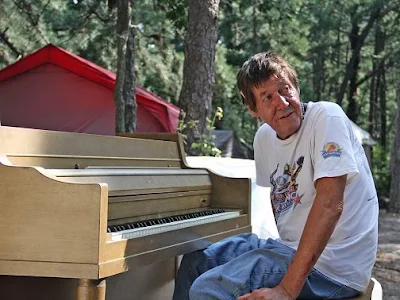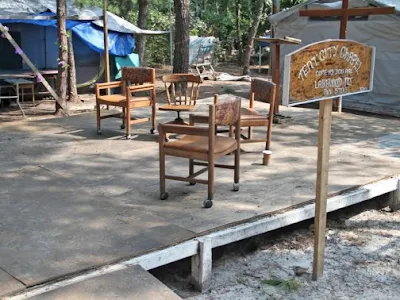Take note, folks, this is America for those the banks have squeezed out and disposed of.
September 8, 2011
Inside his tepee in the woods outside Lakewood, NJ, at the homeless Tent City, the roosters wake early and the mornings are already cooler. A musician who lost his Florida home in the housing crisis, Hardman says he floats in and out of Tent City, that he's proud of his kids, and misses the life he no longer has.
He has a lot of company out here.
Click here for the pictures and story >
Tent City made the news recently and while community leader Steven Brigham says the media attention brought in greater donations, it also brought unwanted attention from the local politicians.
After battling with the city for years to have access to the public land here, Brigham found a New Jersey lawyer to represent his case pro bono.
The attorney, Jeff Wild, argued that the homeless population is part of the public and should therefore have access to public lands. Rather than take the case to court, Lakewood City Council settled, and Brigham signed an agreement to put up no more shelters and allow no more than 70 people to stay.
But last winter the community put up three wooden structures to house everyone and keep them warm.
"We didn't lose anybody last year," Brigham says, "and nobody got sick."
This year could be different. After City Council members saw the shelters on TV, they sent demolition crews in. The walls were torn down around whatever was inside, and meager furnishings were left to the elements.
This year, the tent city's residents will have to put wood-stoves in tents and plastic shanties, increasing fire risk. Brigham says the town is making it impossible to survive there, hoping to get the homeless out, and he's concerned it will end up killing people this year.
More than 700,000 people are currently homeless in the U.S. and the number has grown 20 percent from 2007 to 2010.
A recent UN report says the way the U.S. denies its citizens access to water, basic sanitation, and criminalizes homelessness is a violation of the Universal Declaration of Human Rights and the International Covenant on Economic, Social and Cultural Rights.
Brigham can relate. He started the camp five years ago and more people show up every year. Some stay, some find part-time work where they can, move on, and wind up coming back.
"There's a real glut of low-skilled manual labor in the area," he says. "There's just nothing for people to do."
Brigham works as a high-voltage electrical contractor on the bridges and tunnels around New York, but his mission is here in the Lakewood forest.
"I found this spot that had no underbrush, which is very unusual," he says, "and this community's become a living protest."
I ask him what he means, and he says, "We're protesting the insincerity of the political system. It's supposed to be for the people and it’s not."
(Reverend Steve Brigham can be reached at P.O. Box 326, Lakewood, NJ 08701)
70 people live at this homeless camp in the woods
Some people have lived here for years and consider it their home
The camp is run by Reverend Steven Brigham
and welcomes residents from all walks of life
Food comes in sporadically, like these baked goods from a local grocery store
Nina is from Poland and according to Steve, moved into camp
when her husband kicked her out.
She has family in Poland that she misses very much
This is Nina's shanty
She has car batteries rigged up for power
This is musician Doug Hardman who plays piano for the church services
~ watch a video of him playing below
Doug lives in this tee-pee
Even with all the rain from Irene the inside is dry and smells like old smoke
Daily essentials
Elwood Hyers lives here and decorated the outside of his shanty
with stuff he found behind a Dollar Store
Elwood lives with Cynthia Vellinga who decorated the inside
Marilyn and Mike lost their NYC jobs in the recession
~ ran down their savings and had nowhere else to go
They raise chickens and rehabilitate birds
~ they have a tent and the chickens have a tent
There are public facilities like toilets
A wash house
A washer and dryer
And a basket of toiletries by the door
There's also a kitchen
Currently filled with food from a wedding and donated by the party house
The chef lives here
There's a chicken crossing sign painted by Marilyn
Chickens are everywhere ~ the eggs hatch
and the birds never get slaughtered ~
they keep down the number of bugs. This is Clover.
There's a public garden named for a young girl who died from cancer
A food storage shed
A bell/empty oxygen cylinder - calls people to church - listen to it ring below
A church that was torn down
A group of Mormon missionaries were there Saturday helping chop wood for winter
The camp will go through a stack this size, every day, all winter long
Community sleep houses like this were put up ~
to keep everyone warm and safe in the winter.
But the town came in and tore them all down
Leaving a mess and a winter filled with wood-burning fires
inside everyone's tents and shanties
Despite their situation, people here still love their country
Related Posts:


































Wow. Thanks for posting that, Noor. Actually, after living for months in homeless shelters, I think the tent city the people have set up looks pretty nifty, just so long as the town doesn't come in and destroy everything ...!
ReplyDeleteThe longest I lived in a shelter was pretty much like prison except we got kicked out on the street during the day. I wrote about my early experience with homeless shelters here: http://portland.indymedia.org/en/2002/07/15147.shtml
Thanks, Noor! Then, this is America!
ReplyDelete